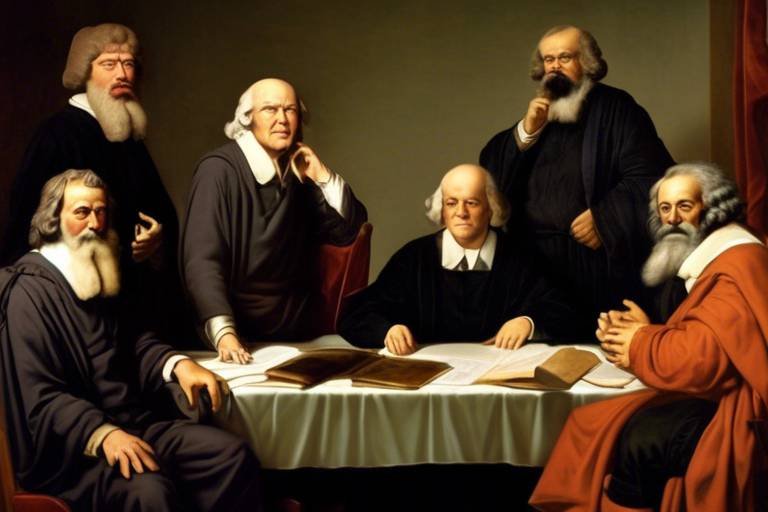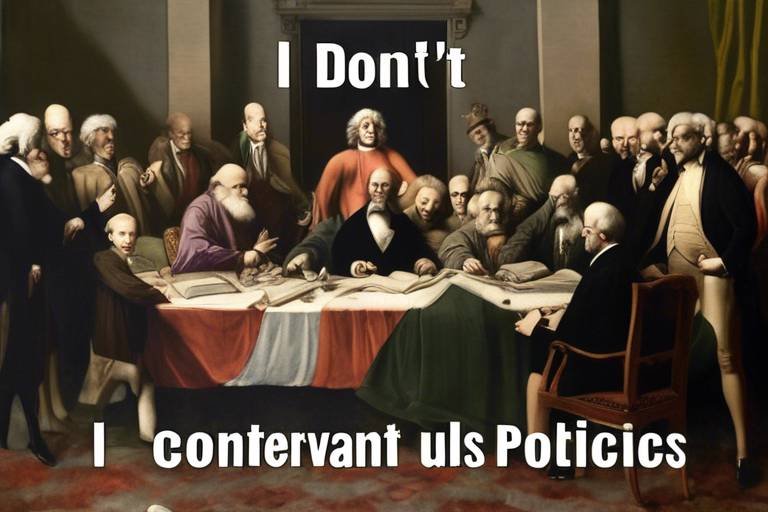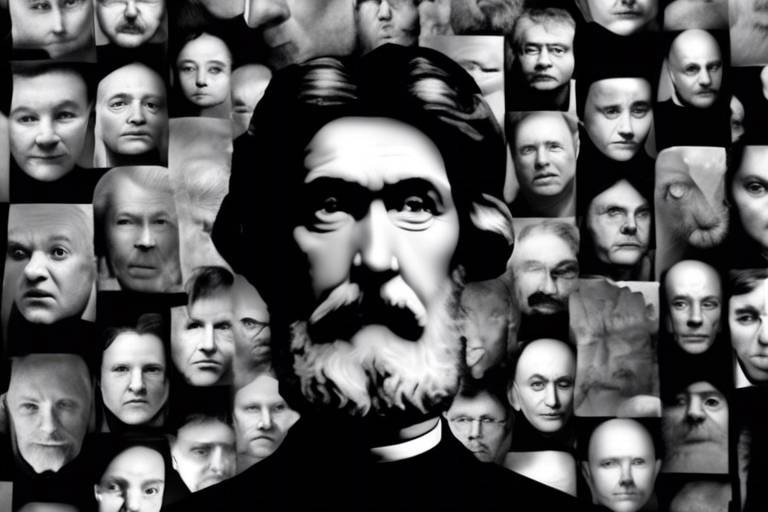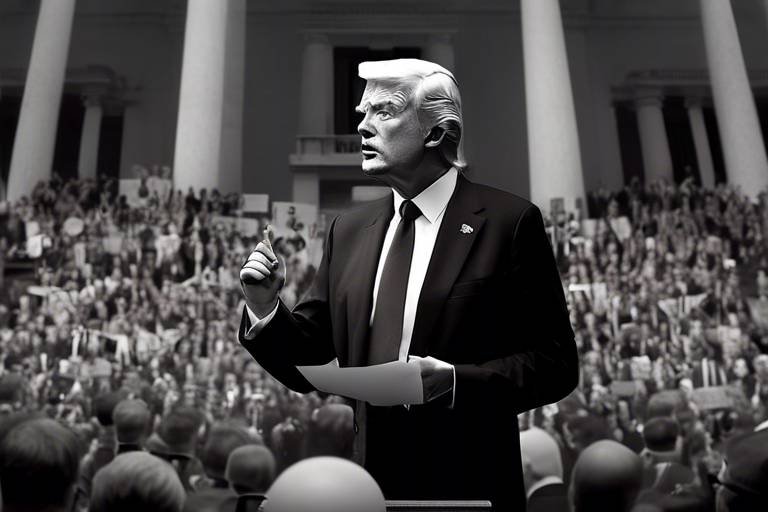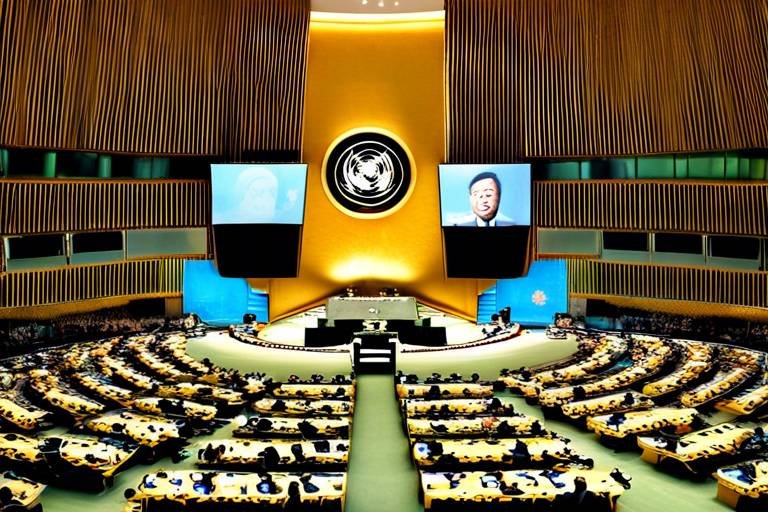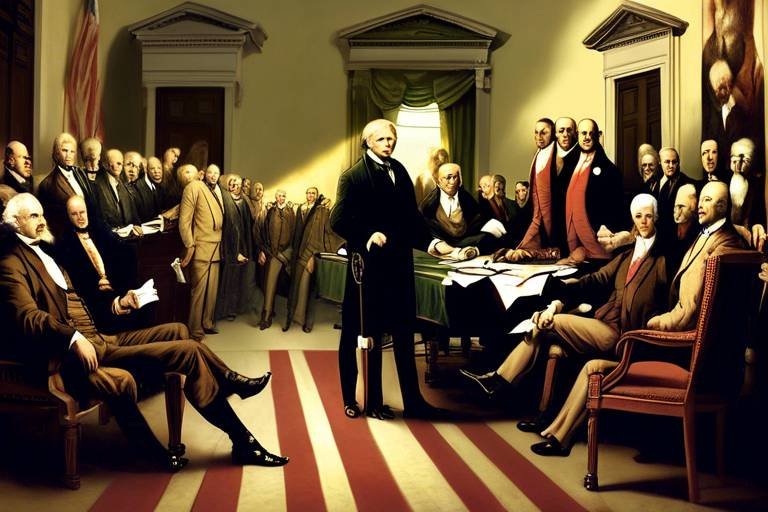Philosophy, Ethics and Politics: The Triangular Linkage
Have you ever wondered how the ideas we hold about existence, morality, and governance are intertwined? The relationship between philosophy, ethics, and politics is not just a theoretical exercise; it's a dynamic interplay that shapes our societies and influences our lives. This article takes you on a journey through this intricate web, exploring how these fields connect and impact one another.
At its core, philosophy provides the foundational questions and frameworks that guide our understanding of both ethics and politics. Think of philosophy as the lens through which we view the world—it helps us discern what is right and wrong, what makes a government legitimate, and how we should treat one another. Without philosophy, our ethical and political landscapes would be like a ship adrift at sea, lacking direction and purpose.
Ethics, on the other hand, serves as the moral compass within the political realm. It informs the decisions made by leaders and the policies enacted in governance. When politicians make choices, they are not merely considering the practical implications; they are also weighing the moral consequences of their actions. This is where the rubber meets the road, as ethical considerations can lead to significant changes in how societies function.
Moreover, the influence of politics on ethics cannot be understated. Political systems often reflect or challenge the prevailing moral values of society. For instance, consider how movements for social justice have emerged in response to political injustices. These movements are deeply rooted in ethical theories that advocate for equality and fairness, demonstrating the powerful interplay between ethics and politics.
In summary, the triangular linkage between philosophy, ethics, and politics is a fascinating and complex relationship. Each field informs and shapes the others, creating a rich tapestry of thought that influences societal values and governance structures. As we delve deeper into this article, we will explore each aspect of this relationship in detail, providing insights that illuminate the importance of understanding these connections.
- What is the main focus of the article? The article explores the interconnectedness of philosophy, ethics, and politics, examining how these fields influence one another.
- Why is philosophy important in understanding ethics and politics? Philosophy provides the foundational frameworks and critical questions that guide our understanding of morality and governance.
- How does ethics influence political decision-making? Ethics serves as a moral compass that guides leaders in their decision-making processes, impacting governance and public policy.
- Can politics change ethical standards in society? Yes, political decisions can reflect or challenge societal ethical norms, leading to shifts in moral values.

The Foundations of Philosophy
Philosophy serves as the bedrock for understanding ethics and politics, providing critical frameworks and questions about existence, knowledge, and morality that guide political thought and ethical considerations. At its core, philosophy is about asking the big questions: Why are we here? What is the nature of reality? How should we live our lives? These inquiries are not just abstract musings; they have profound implications for how societies are structured and governed.
One of the key aspects of philosophy is its ability to challenge our assumptions and provoke critical thinking. For instance, when we discuss morality, we are not just talking about right and wrong in a vacuum. We are exploring the principles that underpin our decisions and actions, which in turn influence political ideologies and ethical norms. The interplay between philosophy, ethics, and politics is akin to a three-legged stool—if one leg is weak, the entire structure becomes unstable.
Philosophers like Socrates, Plato, and Aristotle laid the groundwork for Western thought, introducing concepts that remain relevant today. Socrates, with his method of questioning, encouraged individuals to examine their beliefs critically. Plato, through his allegory of the cave, illustrated the difference between the perceived reality and the true form of knowledge. Aristotle brought a more empirical approach, emphasizing observation and experience as pathways to understanding. These foundational ideas continue to resonate in contemporary discussions about governance and morality.
The foundations of philosophy can be categorized into several branches, each addressing different aspects of human experience:
- Metaphysics: The study of existence and reality, asking questions about what is ultimately real.
- Epistemology: The investigation of knowledge—what we know, how we know it, and the limits of our understanding.
- Ethics: The exploration of moral principles that govern our behavior, guiding us in determining what is right and wrong.
- Political Philosophy: The study of government, justice, rights, and the role of individuals within a society.
These branches are interconnected, with each influencing the others in significant ways. For example, ethical theories often stem from metaphysical beliefs about human nature and the universe. Similarly, political philosophy is deeply rooted in ethical considerations, as it seeks to establish what constitutes a just society. This interconnectedness underscores the importance of a philosophical foundation in shaping both ethical frameworks and political systems.
In conclusion, the foundations of philosophy provide a critical lens through which we can examine the complexities of ethics and politics. By fostering a deeper understanding of existence, knowledge, and morality, philosophy equips individuals with the tools necessary to navigate the intricate landscape of human society. As we delve further into the relationship between these fields, we will uncover the profound impact that philosophical thought has on our ethical decisions and political actions.

The Role of Ethics in Politics
When we think about politics, we often envision the grand debates, the power struggles, and the intricate dance of governance. However, lurking beneath the surface of these political machinations is a vital element that shapes every decision made: ethics. Ethics is not just a set of abstract principles; it is the moral compass that guides political leaders and institutions in their quest for justice, equity, and the common good. Without a firm ethical foundation, political actions can easily devolve into mere power plays, devoid of integrity and accountability.
Consider the implications of ethical frameworks in political decision-making. When politicians are faced with tough choices, their ethical beliefs often come into play. Are they prioritizing the needs of their constituents, or are they swayed by personal interests or party loyalty? An ethical approach to politics demands that leaders reflect on their values and the impact of their decisions on society. This is where ethical theories come into the spotlight, providing a lens through which to analyze political actions.
For instance, politicians might adhere to utilitarianism, which advocates for actions that promote the greatest good for the greatest number. This theory encourages leaders to evaluate the consequences of their policies and strive for outcomes that benefit the majority. However, it also raises questions: what happens to minority rights? Are the ends justifying the means? These dilemmas illustrate the delicate balance between ethical considerations and political expediency.
On the other hand, some politicians may align with deontological ethics, which emphasizes duty and adherence to rules. This approach focuses on the morality of actions themselves rather than their outcomes. Leaders who adopt this perspective might prioritize upholding laws and ethical standards, even if it means sacrificing short-term gains. This commitment to integrity can foster public trust and accountability, essential components of a healthy political system.
Moreover, the influence of ethics in politics extends beyond individual leaders; it permeates the very fabric of governance. Political institutions, laws, and policies are often reflections of the ethical values upheld by society. When ethical standards are high, we tend to see more transparent governance, equitable laws, and a commitment to social justice. Conversely, when ethical considerations are sidelined, corruption, injustice, and inequality can flourish.
To illustrate the dynamic interplay between ethics and politics, let's consider a few key points:
- Influence on Decision-Making: Ethical frameworks guide leaders in making choices that align with their moral beliefs.
- Public Trust: Ethical behavior fosters trust between the government and its citizens, essential for a stable society.
- Accountability: Adherence to ethical standards holds leaders accountable for their actions, promoting responsible governance.
In conclusion, the role of ethics in politics cannot be overstated. It serves as the backbone for political integrity, guiding leaders in their pursuit of justice and the common good. As society continues to evolve, the need for ethical governance becomes increasingly critical. Political leaders must not only understand the ethical implications of their actions but also embrace them as a fundamental aspect of their leadership. After all, in the world of politics, it is not just about winning; it is about doing what is right.
Q: Why is ethics important in politics?
A: Ethics is crucial in politics because it guides decision-making, fosters public trust, and ensures accountability among leaders.
Q: How do ethical theories influence political actions?
A: Ethical theories provide frameworks that help politicians evaluate their decisions, balancing the needs of the majority with the rights of minorities.
Q: Can politics exist without ethics?
A: While politics can operate without ethical considerations, such an approach often leads to corruption, injustice, and a lack of public trust.

Utilitarianism and Political Decision-Making
Utilitarianism, a pivotal ethical theory, serves as a guiding light in the murky waters of political decision-making. At its core, this philosophy advocates for actions that maximize overall happiness and well-being, often summarized by the phrase “the greatest good for the greatest number.” But how does this principle translate into the complex realm of politics? In practice, it calls for leaders and policymakers to weigh the outcomes of their decisions against the potential benefits and harms to the population at large. This balancing act can be both enlightening and challenging, as it prompts significant questions about whose happiness counts and how to measure it.
When politicians embrace utilitarian principles, they often resort to a systematic approach to evaluate policies. They might consider a variety of factors, such as economic impact, social welfare, and environmental sustainability. For instance, a government might implement a new tax policy aimed at funding public services. In this scenario, policymakers would assess whether the benefits—like improved healthcare and education—outweigh the drawbacks, such as increased financial burden on taxpayers. The decision-making process can be illustrated in the following table:
| Policy Option | Benefits | Drawbacks | Net Effect |
|---|---|---|---|
| Increased Tax for Education | Better schools, higher literacy rates | Higher financial burden on families | Positive if long-term benefits outweigh costs |
| Subsidies for Renewable Energy | Cleaner environment, job creation | Initial costs for government | Positive if environmental benefits are significant |
This method of decision-making emphasizes a pragmatic approach, but it is not without its pitfalls. Critics argue that utilitarianism can lead to morally questionable choices, especially when the happiness of a minority is sacrificed for the greater good. For example, consider policies that might benefit the majority but disenfranchise marginalized groups. The ethical implications of such decisions can create a slippery slope where the ends justify the means, leading to potential abuses of power and exploitation.
Moreover, the challenge of quantifying happiness complicates the utilitarian calculus. How do we measure the impact of a policy on the well-being of individuals? Is it through economic metrics, health outcomes, or social satisfaction? These questions highlight the subjective nature of happiness and the difficulties inherent in applying utilitarian principles consistently across diverse populations. As a result, political leaders must tread carefully, ensuring that their decisions do not inadvertently harm those they aim to help.
In conclusion, while utilitarianism provides a compelling framework for political decision-making, it requires a nuanced understanding of its implications. Policymakers must grapple with the ethical dilemmas it presents, striving to create policies that genuinely promote the common good without sacrificing the rights and well-being of individuals. This delicate balance is crucial for fostering a just society where ethical governance prevails.
- What is utilitarianism? Utilitarianism is an ethical theory that suggests that the best action is the one that maximizes overall happiness or utility.
- How does utilitarianism apply to politics? In politics, utilitarianism influences decision-making by encouraging policies that aim to benefit the majority, weighing the overall good against potential harms.
- What are some criticisms of utilitarianism? Critics argue that utilitarianism can justify harmful actions against minorities and that it is challenging to measure happiness objectively.
- Can utilitarianism lead to ethical dilemmas? Yes, utilitarianism can create ethical dilemmas, especially when decisions that benefit the majority negatively impact a minority.

Challenges of Utilitarian Ethics
Utilitarian ethics, while appealing for its straightforward approach to maximizing overall happiness, is not without its challenges and criticisms. One of the most significant issues arises from the notion that the **greatest good for the greatest number** might overlook the rights and dignity of individuals. Imagine a scenario where a government decides to implement a policy that benefits a majority but severely harms a minority. This raises the question: is it justifiable to sacrifice the well-being of a few for the happiness of many? Such dilemmas highlight a fundamental flaw in utilitarianism—its potential to justify harmful actions under the guise of collective benefit.
Moreover, utilitarianism often struggles with the problem of measurement. How do we quantify happiness? Is it possible to compare the joy of one person against the suffering of another? These questions can lead to a slippery slope where subjective experiences are reduced to mere numbers, potentially distorting moral judgments. For instance, if a government were to prioritize economic growth over environmental conservation, it might argue that the overall increase in wealth justifies the ecological damage. However, this raises ethical concerns about the long-term consequences of such decisions on future generations.
Additionally, utilitarianism can foster a **short-sighted perspective**. When political leaders focus solely on immediate outcomes, they may neglect the broader implications of their choices. For example, a policy that provides quick relief to a community in crisis might have adverse effects in the long run, such as increased dependency on government aid or the erosion of community resilience. This highlights the challenge of balancing short-term benefits with long-term ethical considerations.
In light of these challenges, it is crucial for policymakers to remain vigilant and consider a broader ethical framework. While utilitarianism provides a useful lens for evaluating the consequences of actions, it should not be the sole guiding principle. Integrating other ethical theories, such as deontological ethics, can help ensure that individual rights are respected and that political decisions reflect a more comprehensive understanding of morality.
- What is utilitarian ethics? Utilitarian ethics is a moral philosophy that suggests actions are right if they promote the greatest happiness for the greatest number of people.
- What are the main criticisms of utilitarianism? Critics argue that utilitarianism can justify harmful actions against individuals, struggles with measuring happiness, and may lead to short-sighted political decisions.
- How can utilitarianism be applied in politics? Utilitarianism can guide policymakers to consider the consequences of their actions on the overall well-being of the population, but it should be balanced with other ethical considerations.

Case Studies in Utilitarian Politics
When we dive into the realm of utilitarian politics, we can see how this ethical framework has influenced real-world decisions, sometimes with remarkable outcomes and other times with significant backlash. One of the most illustrative case studies is the implementation of social welfare programs. Governments often justify these initiatives by claiming they aim to provide the greatest good for the greatest number, a core tenet of utilitarianism. But how do these policies play out in practice?
Take, for instance, the introduction of universal healthcare in various countries. In places like Canada and the United Kingdom, the decision to provide healthcare as a public good was rooted in the idea that it would improve overall public health and reduce suffering. By analyzing the outcomes, we can see that these systems have indeed resulted in lower overall healthcare costs and better health outcomes for the majority. However, critics argue that such systems can lead to longer wait times and reduced quality of care for some patients. This raises the question: does the benefit to the majority justify the potential harm to a minority?
Another compelling example can be found in the realm of environmental policy. The government decisions surrounding climate change often hinge on utilitarian principles, weighing the immediate economic benefits of industrial growth against the long-term impacts on the planet. The Paris Agreement serves as a prime example, where nations collectively agreed to limit greenhouse gas emissions to protect the environment for future generations. While this agreement aims for the greatest good globally, the disparities in economic capabilities among nations often lead to tensions and accusations of unfairness. Some argue that wealthier nations should bear a greater burden due to their historical contributions to pollution.
To further illustrate the complexities of utilitarianism in politics, let’s consider a few more case studies:
| Case Study | Utilitarian Justification | Consequences |
|---|---|---|
| Universal Healthcare | Improve public health and reduce costs | Better health outcomes for many, but potential wait times for some |
| Paris Agreement | Global environmental protection | Long-term benefits for the planet, but economic disparities |
| War on Terror | National security and global stability | Loss of life and ethical dilemmas regarding collateral damage |
Lastly, the War on Terror provides a stark illustration of utilitarian ethics in action. The justification for military interventions has often been framed as a means to protect the greater good—national security and the safety of citizens. However, this approach has led to countless ethical dilemmas, including civilian casualties and the destabilization of regions. Here, the utilitarian calculus becomes murky: how many lives lost in the name of security are acceptable? The consequences of these actions can ripple through generations, leading to further conflict and suffering.
In conclusion, while utilitarianism offers a compelling framework for decision-making in politics, the real-world applications often reveal a complex interplay of benefits and drawbacks. Each case study highlights the necessity for careful consideration of the ethical implications and potential consequences of policies aimed at achieving the greatest good. As we continue to navigate these challenging waters, it becomes increasingly clear that the balance between ethical theory and practical governance is not just a philosophical debate, but a critical necessity for effective leadership.
- What is utilitarianism? Utilitarianism is an ethical theory that suggests that the best action is the one that maximizes utility, generally defined as that which produces the greatest well-being of the greatest number of people.
- How does utilitarianism apply to politics? In politics, utilitarianism can guide decision-making by prioritizing policies that aim to benefit the majority, often weighing the overall happiness against potential harms.
- What are some criticisms of utilitarianism? Critics argue that utilitarianism can justify harmful actions if they benefit the majority, potentially overlooking the rights and well-being of minorities.
- Can you give an example of utilitarianism in action? The implementation of social welfare programs is a common example, where the government aims to improve the lives of the majority, although it may lead to challenges for some individuals.

Deontological Ethics and Political Integrity
Deontological ethics, often associated with the philosopher Immanuel Kant, emphasizes the importance of duty and adherence to rules as the foundation for moral action. In the realm of politics, this ethical framework stands in stark contrast to utilitarianism, which focuses on the outcomes of actions rather than the actions themselves. While utilitarianism may advocate for the greatest good for the greatest number, deontological ethics insists that certain actions are inherently right or wrong, regardless of their consequences. This principle is crucial for maintaining political integrity, as it compels leaders to act according to moral duties and obligations rather than merely pursuing favorable outcomes.
In a political context, deontological ethics can manifest in various ways. For instance, politicians may be guided by a sense of duty to uphold the law, protect human rights, or serve the public interest. This adherence to moral principles can foster trust between the electorate and their representatives, as it signifies a commitment to ethical governance. However, the challenge arises when political leaders are faced with decisions that pit their duties against the potential for greater societal benefit. For example, a politician may grapple with the decision to implement a policy that, while ethically sound, could lead to unintended negative consequences for a minority group.
Moreover, the application of deontological ethics can be seen in the formulation of laws and policies. When lawmakers prioritize their moral duties, they are more likely to create legislation that reflects justice and fairness. This is especially important in democratic societies, where the rule of law is paramount. By grounding political actions in ethical principles, leaders can ensure that their governance is not only effective but also morally justifiable. This creates a framework where accountability is paramount, as politicians are expected to answer for their actions based on ethical standards.
To better understand the relationship between deontological ethics and political integrity, consider the following key principles:
- Duty to Uphold the Law: Politicians are bound by their duty to follow and enforce laws that protect citizens' rights.
- Respect for Individual Rights: Deontological ethics emphasizes the importance of treating individuals with dignity, regardless of the consequences.
- Accountability: Political leaders must be held accountable for their actions, ensuring that they align with ethical standards.
In conclusion, deontological ethics plays a vital role in shaping political integrity. By grounding political decisions in a framework of moral duties, politicians can foster trust, accountability, and justice within society. This ethical approach not only enhances the legitimacy of political systems but also encourages leaders to prioritize the well-being of their constituents over mere political expediency. As we navigate the complexities of governance, embracing deontological ethics can serve as a guiding light, illuminating the path towards a more ethical and just political landscape.
Q: What is deontological ethics?
A: Deontological ethics is an ethical theory that emphasizes the importance of duty and adherence to rules, regardless of the consequences of actions.
Q: How does deontological ethics apply to politics?
A: In politics, deontological ethics guides leaders to act according to moral principles, ensuring that their decisions uphold justice, accountability, and individual rights.
Q: Can deontological ethics conflict with utilitarianism?
A: Yes, deontological ethics can conflict with utilitarianism, as the former focuses on the morality of actions themselves, while the latter prioritizes the outcomes of those actions.
Q: Why is political integrity important?
A: Political integrity is crucial for fostering trust between citizens and their leaders, ensuring that governance is conducted ethically and justly.

The Interplay Between Ethics and Social Justice
The relationship between ethics and social justice is both profound and intricate, weaving together the moral fabric of society. At its core, social justice strives for equality and fairness, while ethics provides the guiding principles that inform our understanding of what is right and just. Imagine ethics as the compass that directs us through the maze of societal issues, ensuring that our decisions not only benefit the few but uplift the many. This interplay becomes especially evident when we consider how ethical frameworks motivate social movements and influence public policy changes.
Throughout history, various ethical theories have underpinned social justice movements, shaping their goals and methodologies. For instance, utilitarianism, which advocates for the greatest good for the greatest number, has often been a driving force behind policies aimed at reducing poverty and inequality. On the other hand, deontological ethics, which emphasizes duties and rules, calls for unwavering adherence to principles of justice and rights, regardless of the consequences. This duality in ethical perspectives highlights the complexity of social justice, as different movements may prioritize different ethical foundations based on their unique contexts and objectives.
Moreover, the impact of politics on ethical standards cannot be overstated. Political decisions often reflect or challenge prevailing moral values, serving as a litmus test for society's ethical compass. For example, legislation aimed at promoting civil rights may emerge from a political climate that values equality and justice, thereby reinforcing ethical standards. Conversely, policies that perpetuate discrimination or inequality can lead to a reevaluation of societal ethics, prompting movements that demand change. This dynamic relationship illustrates how politics can redefine ethical norms and societal expectations, making it essential for activists to navigate both realms effectively.
To further explore this interplay, let's take a look at some key ethical theories and their influence on social justice movements:
| Ethical Theory | Influence on Social Justice Movements |
|---|---|
| Utilitarianism | Focuses on policies that maximize overall happiness, often advocating for welfare programs and social safety nets. |
| Deontological Ethics | Emphasizes rights and duties, driving movements focused on civil rights and anti-discrimination laws. |
| Virtue Ethics | Encourages the cultivation of moral character, influencing grassroots activism that promotes community values. |
As we dissect these theories, it's clear that the ethical foundations of social justice movements are diverse and multifaceted. Each theory brings its own lens through which to view issues of inequality, prompting activists to adopt various strategies in their pursuit of justice. The interplay between ethics and social justice is not merely theoretical; it is a living, breathing dialogue that shapes our world today.
In conclusion, understanding the interplay between ethics and social justice is crucial for anyone engaged in advocacy or policy-making. As we navigate the complexities of our society, we must remember that our ethical choices have the power to shape the future. By aligning our actions with a strong ethical foundation, we can contribute to a more just and equitable world, where every voice is heard and valued.
- What is the relationship between ethics and social justice?
Ethics provides the moral framework that guides social justice movements, ensuring that actions taken are rooted in principles of fairness and equality.
- How do different ethical theories influence social justice?
Different ethical theories, such as utilitarianism and deontological ethics, offer various perspectives on what constitutes justice, shaping the goals and methods of social movements.
- Can politics affect ethical standards?
Yes, political decisions can either reinforce or challenge existing ethical norms, leading to shifts in societal values and expectations.

Ethical Theories in Social Justice Movements
Social justice movements are often fueled by a variety of ethical theories that provide the moral foundation for their goals and actions. These movements arise from a deep-seated belief in the need for fairness, equality, and the protection of human rights. At the heart of these theories is the idea that every individual deserves respect and dignity, regardless of their background. For example, utilitarianism advocates for actions that maximize overall happiness, which can drive movements aimed at improving societal well-being. However, it’s essential to recognize that different ethical frameworks can lead to different approaches in activism.
One of the most prominent ethical theories in social justice is liberalism, which emphasizes individual rights and freedoms. This theory has inspired movements focused on civil rights, gender equality, and LGBTQ+ rights. The liberal approach argues that everyone should have the freedom to pursue their own happiness, and any societal barriers that inhibit this freedom should be dismantled. For instance, the fight for marriage equality was rooted in the belief that love is a fundamental human right, deserving of legal recognition and protection.
In contrast, communitarianism emphasizes the role of community and social cohesion. This ethical perspective argues that individuals are not isolated entities but are deeply embedded in their communities. Movements that draw from communitarian ethics often focus on collective rights and the importance of social bonds. For example, indigenous rights movements advocate for the recognition of community-based land rights and cultural preservation, emphasizing the interconnectedness of individuals within their communities.
Moreover, feminist ethics has significantly shaped social justice movements by challenging traditional power dynamics and advocating for gender equality. Feminist theorists argue that ethical considerations must include the experiences and perspectives of women and marginalized groups. This approach has led to a broader understanding of justice, one that encompasses not only legal equality but also social and economic equity. The #MeToo movement, for instance, highlights the need for a societal shift in how we perceive and address issues of sexual harassment and violence, rooted in feminist ethical principles.
To illustrate how these ethical theories manifest in social justice movements, consider the following table:
| Ethical Theory | Key Focus | Example Movement |
|---|---|---|
| Utilitarianism | Maximizing overall happiness | Healthcare reform for all |
| Liberalism | Individual rights and freedoms | Civil rights movements |
| Communitarianism | Community and social cohesion | Indigenous rights movements |
| Feminist Ethics | Gender equality and empowerment | #MeToo Movement |
These ethical frameworks not only guide the actions of social justice advocates but also shape the policies that emerge from these movements. By grounding their efforts in robust ethical theories, activists can articulate their goals more clearly and resonate with a broader audience. Ultimately, the interplay of these ethical perspectives enriches the dialogue around social justice, allowing for a more nuanced understanding of what it means to strive for a fair and equitable society.
- What are ethical theories? Ethical theories are systematic frameworks that provide guidance on how to evaluate moral issues and make decisions based on principles of right and wrong.
- How do ethical theories influence social justice movements? Ethical theories inform the values and goals of social justice movements, guiding activists in their pursuit of fairness, equality, and human rights.
- Can one ethical theory dominate social justice movements? While certain theories may be more prominent, most movements draw from a combination of ethical frameworks to address complex social issues.

The Impact of Politics on Ethical Standards
Politics and ethics are intertwined in a complex dance, each influencing the other in profound ways. The decisions made by political leaders can either reinforce or challenge existing ethical standards within society. For instance, when a government enacts laws that promote equality and justice, it often reflects and strengthens the prevailing ethical norms. Conversely, when political actions undermine these values, they can lead to a significant shift in societal expectations and moral standards.
One of the most striking examples of this interplay is seen in the realm of civil rights. Historical movements, such as the Civil Rights Movement in the United States, not only sought to change laws but also aimed to reshape the ethical landscape of the nation. Leaders like Martin Luther King Jr. appealed to the moral conscience of the public, arguing that the existing laws were unjust. His advocacy illustrated how political action can serve as a catalyst for ethical reflection and change, prompting society to reconsider its values and priorities.
Moreover, political scandals often expose the fragility of ethical standards. When politicians engage in unethical behavior, such as corruption or dishonesty, it can lead to public outrage and a demand for accountability. This reaction can serve as a powerful reminder of the importance of ethical governance. For example, the Watergate scandal in the 1970s not only resulted in the resignation of President Nixon but also sparked a nationwide conversation about the integrity of political leaders and the ethical responsibilities of public office. Such events can redefine what is considered acceptable behavior in politics and influence the ethical standards that citizens expect from their leaders.
Additionally, the media plays a crucial role in shaping the relationship between politics and ethics. In today's digital age, information spreads rapidly, and public scrutiny is more intense than ever. Politicians are held accountable not only for their actions but also for their words. This heightened visibility means that ethical lapses can have immediate and far-reaching consequences, prompting a reevaluation of ethical norms. For instance, the #MeToo movement highlighted issues of sexual harassment and assault, leading to significant political repercussions and a shift in societal attitudes towards these behaviors.
It's also essential to recognize that the impact of politics on ethical standards is not uniform across all societies. Cultural contexts play a significant role in how political actions are perceived and the ethical implications they carry. In some countries, political decisions may be viewed through a lens of collectivism, where the needs of the community outweigh individual rights. In contrast, in more individualistic societies, personal freedoms and ethical standards may take precedence, leading to different political responses and ethical expectations.
In conclusion, the interplay between politics and ethical standards is a dynamic and ongoing process. Political actions can challenge or reinforce societal values, prompting shifts in ethical norms. As citizens, it is crucial to remain vigilant and engaged, ensuring that our political leaders uphold the ethical standards that reflect our collective values. After all, a society's ethical foundation is not just built on laws but also on the shared commitment to justice, integrity, and respect for one another.
- How do political decisions influence ethical standards?
Political decisions can either uphold or challenge existing ethical norms, leading to shifts in societal values and expectations. - Can ethical movements impact political change?
Yes, ethical movements often drive political change by raising awareness and advocating for new laws that reflect moral values. - What role does the media play in politics and ethics?
The media serves as a watchdog, holding politicians accountable and shaping public perceptions of ethical standards. - Are ethical standards the same in every culture?
No, ethical standards vary across cultures, influenced by historical, social, and political contexts.
Frequently Asked Questions
- What is the relationship between philosophy, ethics, and politics?
The relationship between philosophy, ethics, and politics is deeply intertwined. Philosophy provides the foundational questions and frameworks that guide ethical considerations, which in turn influence political thought and governance. Essentially, philosophy shapes our understanding of what is right and wrong, while ethics helps to apply these philosophical ideas to real-world political scenarios.
- How does ethics influence political decision-making?
Ethics plays a crucial role in political decision-making by guiding leaders on what actions are considered morally acceptable. Political decisions often reflect ethical theories, such as utilitarianism, which promotes the greatest good for the greatest number. This means that elected officials must weigh the consequences of their actions and policies against ethical standards to maintain public trust and accountability.
- What are the main ethical theories that impact politics?
Several ethical theories significantly impact politics, including utilitarianism, which focuses on outcomes, and deontological ethics, which emphasizes duty and rules. Utilitarianism can lead to pragmatic decision-making, while deontological ethics stresses the importance of integrity and accountability in governance. These theories provide different lenses through which political actions can be evaluated.
- Can you provide examples of utilitarianism in politics?
Absolutely! Historical and contemporary case studies illustrate the application of utilitarianism in political decision-making. For instance, policies aimed at public health, like vaccination programs, often reflect utilitarian principles by prioritizing the overall well-being of the population. However, it’s essential to recognize that utilitarianism can also lead to ethical dilemmas when the needs of the minority are overlooked for the majority's benefit.
- What challenges does utilitarianism face in political contexts?
Utilitarianism faces several challenges in political contexts, particularly the risk of justifying harmful actions if they benefit the majority. This dilemma raises ethical questions about human rights and justice. Critics argue that utilitarianism can lead to morally questionable decisions, such as sacrificing the well-being of a few for the greater good, which can undermine trust in political leadership.
- How do ethical frameworks influence social justice movements?
Ethical frameworks are vital in shaping social justice movements. Different movements are often grounded in various ethical theories, such as egalitarianism, which advocates for equality. These frameworks motivate activists and influence public policy changes by providing a moral basis for advocating for rights and justice, driving the pursuit of fairness in political systems.
- In what ways does politics shape societal ethical standards?
Politics has a profound impact on societal ethical standards. Political decisions can either reinforce or challenge prevailing moral values, leading to shifts in what is considered ethical behavior within society. For example, legislation on issues like marriage equality or environmental protection can redefine ethical norms and expectations, demonstrating the dynamic interplay between politics and ethics.









